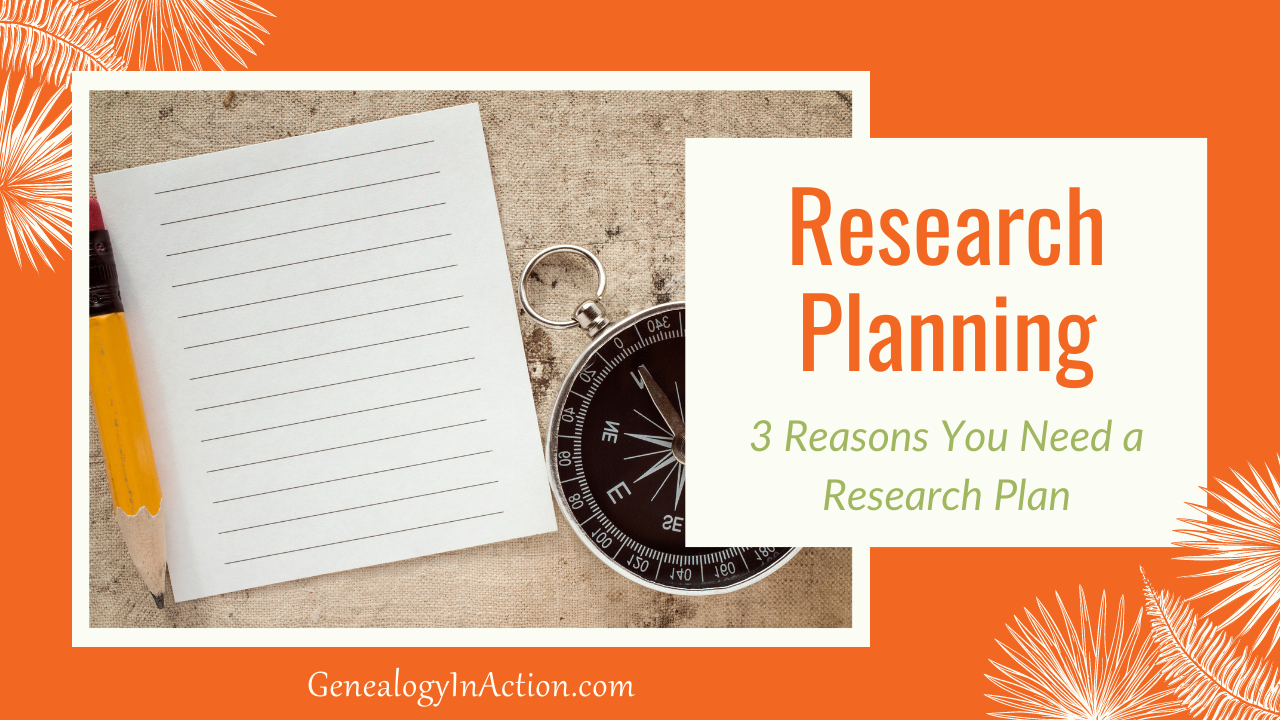
3 Reasons You Need a Research Plan
Jun 15, 2022You might think that taking the time to build a plan for your genealogy research takes the fun out of it. And many years ago, I would have been inclined to agree with you. But honestly, wandering around aimlessly and coming across the same records over and over again really isn't fun after awhile, is it?
We get to this point in our research where we keep circling the same records and databases hoping that something will magically appear. After awhile, we get bored and/or frustrated and simply give up and move on to the next person repeating the same fate, and around and 'round we go.
When you're in this vicious cycle, it's a sign that you need to consciously develop a plan of action so you can actually make progress.
Here are three reasons why a research plan can help you push your research forward.
1. Gain Clarity & Focus
A research plan is intended to keep you focused on the task at hand. By taking the time to develop a plan, you’ll have a clear picture of where you’ve been, you’ll know what specific questions still need answers, and you’ll have a focused path to help you find the answers. Without this focus, it’s very likely you won’t find what you are looking for and you’ll remain stuck. Because of the clarity and focus a plan provides, it can also help you break down those brick walls!
2. Get (& Stay) Organized
A research plan can help you get organized and, more importantly, stay organized. When you know where you're headed, you can put a project away for weeks, months, or even years, and come back to it with a quick review and jump right into research. Additionally, the process that goes into building an effective and actionable research plan can also contribute to getting organized.
3. Scope Out & Find the Right Records
When you're building a plan, you need to decide what records could potentially answer your research question (or at least provide clues), determine if the records are available for a time and place, and figure out how to access them. This is a crucial step in the process, especially if the records are not digitized and available online. Sometimes you have to dig a little to figure out if the record you need is available and where it can be found…even if it’s offline buried in an archive or courthouse! Consciously putting a plan together will help you consider an array of potential sources, including many under-utilized sources that are typically necessary for solving harder research problems. Because of this planning effort, a research plan helps you conduct reasonably exhaustive research, which is a genealogy standard all genealogists should all strive for so you can be confident in your findings and conclusions.
Final Thoughts
While you may not think that spending time up front can save you time, I'm here to tell you that it can. My research sessions both online and on site at repositories is so much more efficient than my no-plan days. In fact, I can actually get something done in just a few minutes because I have a plan. The last few years I haven't been able to dedicate huge chunks of time to genealogy research like I used to. Now, it's 15 minutes here, 30 minutes there, and if I'm lucky, maybe an hour. All I have to do is pull out my plan and look for something I can accomplish in the time that I have. This is all possible because everything is laid out for me...there's no guess work. Before I started using a research plan, I'd waste 15 minutes trying to figure out what to do next and then I wouldn't be able to do it because I no longer had those spare 15 minutes!
It's because I learned the value of a research plan that I built an entire framework around it—I call it my problem-solving framework because essentially all the steps work together to help me build a detailed research plan that helps me solve those seemingly unsolvable research problems. I've been using the framework with my clients over the years, helping them solve various long-standing brick walls.
Announcement
I'm happy to announce that I've just released a self-study mini-course focused on the planning portion of my overall framework.
Research Planning for Genealogists teaches you a step-by-step process to build an actionable research plan so you can get results and start finding the answers to your research questions.
Now, this is not your typical lecture or webinar. It’s a course with three core lessons that are action-based. You’ll go through a lesson, learn the concept, and then implement what you learn right away before heading on to the next lesson. When you complete all the activities, you’ll have an actionable research plan that you can begin to implement.
I’ve also included a lesson that provides helpful tips for researching, and I also show you how I use my research plan as a research log.
And, because I want you to really think outside the box, I’m including my “Ultimate” Source List as a bonus.

If you see the value that a research plan can bring to your genealogy projects, then I'd love for you to enroll in Research Planning for Genealogists.
Can't wait to see you on the inside!
I hope you enjoyed this article and that you’re ready to enroll in Research Planning for Genealogists so you can start making progress on your research projects. If you found this article helpful, be sure to add the Genealogy In Action blog to your favorite RSS reader.
© Julie Tarr. This article was first published at Genealogy In Action; appearance of this article elsewhere, without my permission, violates copyright.
